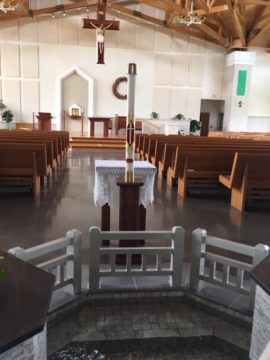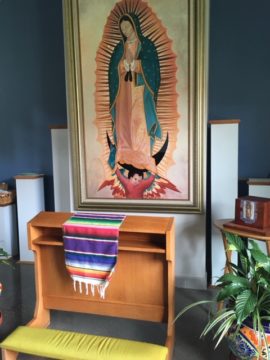As Jesus in this Sunday’s Gospel passes through towns and villages, we offer a Franciscan Gospel reflection and questions written by Fr. Paul Gallagher, OFM for your prayer wherever you live. They are edited by Franciscan Sister of Christian Charity Sister Anne Marie Lom and Joe Thiel. The excerpts from the Sunday readings are prepared by Joe Thiel. To read or download the complete pdf with excerpts for your prayer, please click here: Franciscan Gospel Reflection August 25 2019. Excerpts are from the Lectionary for Mass for Use in the Dioceses of the United States of America, second typical edition © 2001, 1998, 1997, 1986, 1970 Confraternity of Christian Doctrine, Inc., Washington, DC. Used with permission. All rights reserved. No portion of this text may be reproduced by any means without permission in writing from the copyright owner. Photos: St. Thomas Catholic Community, Newton, Wisconsin
Luke 13:22-30
Jesus passed through towns and villages, teaching as he went and making his way to Jerusalem. Someone asked him, “Lord, will only a few people be saved?”
He answered them, “Strive to enter through the narrow gate, for many, I tell you will attempt to enter but will not be strong enough.”
“After the master of the house has arisen and locked the door, then will you stand outside knocking and saying, ‘Lord, open the door for us.’ He will say to you in reply, ‘I do not know where you are from.’ And you will say, ‘We ate and drank in your company and you taught in our streets,’ Then he will say to you, ‘I do not know where you are from. Depart from me, all you evildoers! “And there will be wailing and grinding of teeth when you see Abraham, Isaac and Jacob and all the prophets in the kingdom of God and you yourselves cast out. And people will come from the east and west and from the north and the south and will recline at table in the kingdom of God. For behold, some are last who will be first, and some are first who will be last.”
Background:
Last week the gospel text presented a teaching atypical of Jesus. In the first verse of that text, Jesus said that he came “to set the earth on fire.” (Luke 12:49) The text went on to give Jesus’ description of the division among families that the Christian community of Luke’s time had already begun to experience because of their acceptance of Jesus’ teachings and values. Following that text, Luke’s gospel then goes on to describe Jesus exhorting the crowd, who know how to interpret the signs of the weather but not their own situation, and telling them to make right judgments and avoid being taken into court by their neighbor. The first verses of chapter 13 also describe Jesus addressing the crowds. First he speaks in response to those who get caught up in looking upon others as more sinful because of some tragedy that happened to them. Then he recounts Jesus telling three parables. The first uses a barren fig tree to reveal the compassionate patience of God. The second references a mustard seed and speaks of God’s ability to accomplish greatness with even the smallest of seeds. The third focuses on yeast that, although undetectable, works within the whole measure of dough. Luke’s gospel then unfolds the text that is our gospel for this Sunday.
Here Jesus is described as passing through towns and villages, journeying toward Jerusalem. An unnamed person asks Jesus how many people will be part of the reign of God. In familiar fashion, Jesus redirects the focus from a curiosity question of how many to a more significant question of who will find themselves among the saved. At the heart of the question is a belief commonly held by the Judeans of Jesus’ day: as people of Israel they were part of God’s chosen people, and they assumed they would be part of God’s final realm. The Pharisees, however, held that only a remnant few would be included in the final reign of God.
Much of the life and culture of Jesus’ day was concerned with knowing who belonged within an individual’s in-group, and thus to whom one owed allegiance. Those outside that group were viewed as potential threats to the well-being of one’s primary group. One’s family was part of this in-group by the fact that one shared blood. The sharing of other bodily fluids (blood, saliva, semen or milk) also created a bond between people. The most obvious example would be marriage partners. Another were those who shared the same wet nurse. They were looked upon as brother or sister and could not marry.
Another way of establishing a bond between people was eating together. Throughout both the Christian and Hebrew scriptures, the significance of who is present at the table and at banquets is often a topic of discussion and a symbol used for instruction. Some that might come to mind are:
• the Passover,
• Abraham’s meal with the two strangers,
• Jesus dining with Zacchaeus, the tax collector,
• Jesus’ meals with the disciples after the resurrection, and
• Peter’s eating with the gentile converts who were not circumcised, and then refusing to eat with them after he received criticism for eating with non-Jewish Christians. (This becomes very important to Paul and the whole Christian community.)
The parable Jesus tells in this text challenges those who think they know who will be included. Those who believe that they should be invited into the house (the heavenly banquet) believe that they have been made part of Jesus’ inner circle because they have shared meals together. But twice in the parable the master says to those outside the house, “I do not know where you come from.” (Luke 13:25 and 27) The parable also indicates that among those who are presumed not to be part of the household, there are some who will be welcomed. The parable concludes, “And people will come from the east and the west and from the north and the south and will recline at table in the kingdom of God.” (Luke 13:29) This is a familiar way of saying that people from all nations and ways of life will be part of the final age. It is important to note that some, among those who believe they are part of the household, will find themselves outside the doors and some, who some might presume will not be included, will find welcome. The emphasis would seem to be on how one is striving to enter through the narrow gate and not on membership in a particular group. The narrow gate of the city was the gate through witch only a single person could enter. For the Christians for whom Luke is writing, that narrow gate is a person, Jesus Christ. But the parable would suggest that claiming to be Christian is not sufficient to guarantee admittance.
Reflection Questions:
1. Where do you see people being treated as insiders or as outsiders?
2. Have you ever found yourself treated as insider even though you did not quite fit?
3. Have you ever had the experience of treating another as an insider even though they did not quite fit?
4. When I hear the person asking Jesus how many will be in God’s kingdom, I…
5. Toward the very end of the gospel Jesus tells the crowd “And people will come from the east and the west and from the north and the south and will recline at table in the kingdom of God.” When I hear this statement I…
6. Can you take some time now to talk with God about what you are feeling as you hear Jesus talk about those who are included in the final reign of God, or about your concern for those who might be naïve in their relationship with God, or about your own fears and hopes to be part of the final reign of God?




